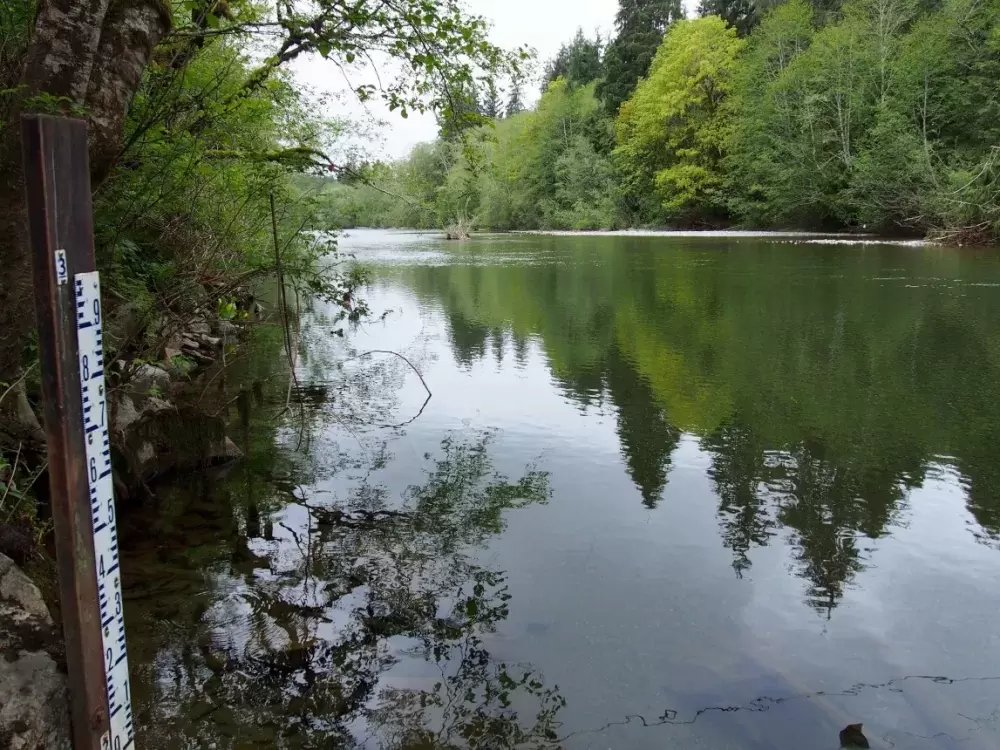As DFO allocates another $3 million in salmon habitat restoration funding — none of it for the Island’s west coast — the NDP is urging Ottawa to triple the amount of money available.
The second round of funding disbursed through the federal-provincial B.C. Salmon and Restoration and Innovation Fund (BCSRIF) was announced June 15. A first series of project allocations, totalling $13 million, was made almost a year ago. West coast habitat restoration projects have so far been left high and dry.
In a videoconference with Fisheries Minister Bernadette Jordan and senior DFO staff, MP and NDP fisheries critic Gord Johns pleaded with the government to loosen purse strings in order to respond with appropriate urgency to the wild salmon crisis.
“My ask is, is the government looking at ramping this up significantly in light of our situation with wild salmon, which is getting way worse, especially with Big Bar?” Johns wondered.
Jordan said the government has so far approved $70 million in applications for the $148-million BCSRIF fund and pointed out there is another round of applications coming forward.
“I know that we are working to get the money out the door as quickly as we can,” Jordan said.
Johns argued that the total value of applications submitted to BCSRIF has been $340 million, a sum that includes “great projects” on the west coast proposed by Indigenous communities, Coastal Restoration Society and West Coast Aquatics. So far, none have received a nod from BCSRIF.
“It sounds to me like you’ve approved just over 20 percent of the applications,” said the Courtenay-Alberni MP. “Clearly this fund isn’t adequate to serve the needs of coastal people.”
The glaring gap in west coast Vancouver Island project funding was duly noted after the first round of announcements, which green-lighted 23 projects in July 2019.
An application by Huu-ay-aht First Nations for salmon habitat restoration work on the Sarita River — extensively damaged by siltation from logging — was rejected in that round. Of five BCSRIF applications made by Uu-a-thluk, NTC’s fisheries department, one was denied and four were deferred to the second round. Staff are still waiting to hear on one of those projects, involving herring research, that is under consideration.
Responding to concerns, DFO staff met with the Council of Ha’wiih Forum on Fisheries and NTC last fall to provide an overview of BCSRIF. What became clear was that DFO assigns greater merit to project applications that involve wider collaborations among groups, said Eric Angel, the NTC’s fisheries manager.
Huu-ay-aht Chief Councillor Robert Dennis Sr. made a motion at the NTC annual general meeting to pursue a multi-nation proposal as well as to advocate for more funding to address restoration on the west coast. The motion passed with a call to “ensure that proper consideration is given to Nuu-chah-nulth First Nations and projects that impact our territories.”
Work on the joint proposal has so far been delayed by the COVID-19 pandemic.
Johns said many of the habitat restoration applications in the queue for funding could qualify as climate mitigation projects. They could also help communities recover from economic turmoil caused by the pandemic shutdown, he said.
“This could be a COVID response, a COVID recovery initiative that could transform coastal British Columbia and save our wild salmon,” Johns said.
“One thing there is consensus on — with Indigenous communities, local governments, recreational and commercial fisheries — is that we need more money for habitat protection,” he added.
Salmon habitat restoration elsewhere in B.C. is cited among projects approved in this latest round. The successful applicants include:
- Gitanyow Fisheries Authority, receiving $867,000 over five years to enhance sockeye spawning on the Kitwanga River.
- Pacific Salmon Foundation, which will use $650,000 over two years to conduct winter trawl surveys in the Gulf of Alaska, continuing ocean research that began in 2018.
- Skeena Fisheries Commission, obtaining $400,000 over four years to build a counting fence in the Bear River watershed.
New applications for funding will be accepted from July 15-Sept. 15.
DFO also outlined 2020 priorities for the funding decisions, which include research of Fraser stocks; habitat restoration projects that target red-listed, threatened salmon stocks; innovation and technology to increase seafood quality and value; selective fishing practices to reduce bycatch of species of concern; new aquaculture technology, and; hatchery upgrades.
DFO staff assured Johns that money to remediate the Big Bar Slide damage is coming from a separate funding stream and will not impinge on habitat restoration dollars.







